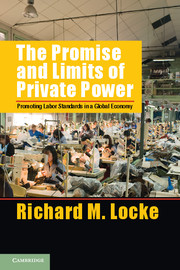Book contents
- Frontmatter
- Contents
- Acknowledgments
- 1 The Rise of Private Voluntary Regulation in a Global Economy
- 2 The Promise and Perils of Private Compliance Programs
- 3 Does Private Compliance Improve Labor Standards?
- 4 Capability Building and Its Limitations
- 5 Alternative Approaches to Capability Building
- 6 Are We Looking in The Wrong Place?
- 7 Complements or Substitutes?
- Conclusion
- Bibliography
- Index
- References
1 - The Rise of Private Voluntary Regulation in a Global Economy
Published online by Cambridge University Press: 05 May 2013
- Frontmatter
- Contents
- Acknowledgments
- 1 The Rise of Private Voluntary Regulation in a Global Economy
- 2 The Promise and Perils of Private Compliance Programs
- 3 Does Private Compliance Improve Labor Standards?
- 4 Capability Building and Its Limitations
- 5 Alternative Approaches to Capability Building
- 6 Are We Looking in The Wrong Place?
- 7 Complements or Substitutes?
- Conclusion
- Bibliography
- Index
- References
Summary
Introduction
When an electronics worker in Suzhou, China, sought compensation for the chemical poisoning he suffered at work, he appealed neither to his employer nor to the government agencies responsible for supervising local workplace standards. Instead, he addressed the global brand that purchased the product he was working on: “We hope Apple will heed to its corporate social responsibility.”
This incident reflects a broader trend in global supply chains. Throughout the world and in many industries, global buyers have acknowledged a degree of responsibility for workplace conditions in supplier factories. They have pledged efforts to ensure that the goods they eventually market are not made under abusive, dangerous, environmentally degrading, or otherwise unethical production conditions. They have committed, in short, to using private, voluntary regulation to address labor issues traditionally regulated by government or labor organizations. For the most part, they have acted on these commitments.
But how effective are these private initiatives at improving labor standards?In this book, I explore both the promise and the limits of private voluntary regulation in today’s global economy. Through a detailed examination of initiatives undertaken by several global brands (e.g., Nike, Hewlett-Packard) – either alone or in collaboration with other firms, nongovernmental organizations (NGOs), and even international organizations such as the International Labor Organization (ILO) – this book sheds light on the conditions under which private, voluntary programs can successfully promote labor standards among their globally dispersed suppliers.
Information
- Type
- Chapter
- Information
- The Promise and Limits of Private PowerPromoting Labor Standards in a Global Economy, pp. 1 - 23Publisher: Cambridge University PressPrint publication year: 2013
